Three months Under the Tuscan Sun Past Review
By A student (Studio Art and Psychology, Trinity University) - abroad from 08/28/2014 to 11/17/2014 with
University of Georgia: Studies Abroad Program in Cortona, Italy
I learned that I miss more than I gain by living life like a rat race. The Italians know how to enjoy life in a way that Americans never learn. I really hope that I can bring some semblance of that peace to my life in the States.
Review Photos
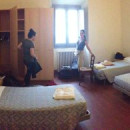
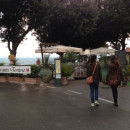
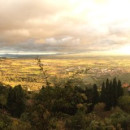
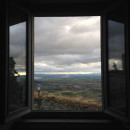
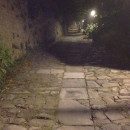
Personal Information
| How much international exposure did you have prior to this program? | None |
Review Your Program
|
* Overall educational experience
Academic rigor, intensity, resources, etc. |
The program administration recommends that students take four courses. Coming from Trinity I had to take five, which I was able to do without too much trouble. Taking three studios at once was pretty intense, but since the dorms and studios are in the same building it wasn't difficult to spend extra time in the studios. Though all of the professors are extremely well qualified and impressive in their own right, it should be noted that most of them rotate and few are stable fixtures at the Cortona campus. Some teach regularly for the University of Georgia either in Athens, GA or in Cortona, but many of the professors were visiting from all over the United States. No matter who happens to be there you will have access to very good professors with a wide range of backgrounds. The studios, while relatively well-equipped are not totally ideal. The painting studio is painted yellow inside, the tools in the metals studio are worn out, and the ceramics studio smells bad when it rains, but there are 8 potters' wheels (my home campus has 0) and a centrifuge in the metals studio (again, home campus 0). While frustrating at first, learning how to solve problems without state of the art equipment became a huge part of my educational experience, and I believe I'm a better artist for it. In general, the courses were not quite as rigorous as my home campus, however a lot of that was because we had mandatory field trips every Saturday into different towns in Tuscany and Umbria. These field trips were included in the cost of the program and many of the professors took advantage of them to show students art and architecture relevant to course material (especially for the required art history classes and classics courses). While this decreased expectations in production of work, it made for a well rounded educational experience. |
|
* Host Country Program Administration
On-site administration of your program |
Chris Robinson (director) and Kris Schramer (assistant director) were both always available, always helpful and infinitely welcoming. |
|
* Housing:
How satisfied were you with your living arrangements? |
Like I said the dorms and studios are in the same building which was very convenient for late nights. We were placed one to three to a room (grad students had singles), the beds were comfortable and the accommodations were similar to a one star hotel. "The Angels" made the beds every day and swept/took out the trash if the room was tidy, and changed and washed the sheets (all provided) once per week. WIFI is not nearly as fast or available in Italy as it is in the states, but UGA does their best. The common room, auditorium, kitchen and library each have their own network. While slow, the WIFI worked relatively okay as long as there were no more than 5 people on the same network at one time. |
| * Food: |
The program includes a continental breakfast every morning as well as evening meals during the week (4 at Tonino's, the only restaurant in town large enough to accommodate the whole group, and one voucher night, worth 17 euro at one of 15 restaurants in town) Tonino's food was good, but lunches and weekends were a struggle as the stove was broken (we had a 2 burner hotplate to share between 30 students), and there was no oven or freezer. Upon request, the director did order us a CrockPot, however. |
|
* Social & Cultural Integration:
How integrated did you feel with the local culture? |
Cortona has been home to this program for 45 years. Even with limited language acquisition, we were part of the local culture as soon as we got there. The townspeople came to the square in anticipation of our first day and took pictures of us. The shopkeepers were all extremely friendly and helped us with our Italian, and it's very easy to get to know the locals when there is only one pub in town. |
|
* Health Care:
How well were health issues addressed during the program? |
I didn't personally face health issues while I was there but two of the girls had emergency dental treatment and another saw a doctor when she got the flu. The assistant director is fluent in Italian and provided transportation and interpretation when seeing the doctors. All three situations were resolved without incident. One difference in Italy though is that while you can use your student insurance, you have to pay for services outright then bill the insurance yourself, so it's best to have money set aside in case of an emergency. |
| * Safety: |
I felt very comfortable walking the streets of Cortona alone, though I stayed with a buddy after dark. Cortona is a safe town, but just like anywhere else, its best not to leaving the pub by yourself early in the morning. |
| If you could do it all over again would you choose the same program? |
Yes
|
Finances
|
* Money: How easily were you able to live on a student's budget?
(1 = not very easy/$200+ on food & personal expenses/week, 2.5 = $100/week, 5 = very easily/minimal cost) |
I spent about $130 a week, but I could have easily lived on $100 or less. |
| Not including program expenses, about how much money did you spend on food and other expenses each week? | $130 |
| Do you have any general money-saving tips for future study abroad participants? | My biggest tip of course is save money before you go so that you can be just a little frivolous while you are living in Italy. However, you can easily save money while you are there by 1) cooking your own meals and 2) eating what the locals eat. You can save so much money by buying your meat at the butchers, your bread and cheese from the bakery and your fruits and veggies from the market, all instead of going to the COOP all-in-one. It doesn't hurt to buy a jar of Nutella for the taste of home though. |
Language
| * Did your program have a foreign language component? | No |
Other Program Information
|
* Where did you live?
Select all that apply |
|
|
* Who did you live with?
Select all that apply |
|
|
* Who did you take classes with?
Select all that apply |
|
| About how many local friends did you make that you will likely keep in touch with? | 0 |
A Look Back
| * What did you like most about the program? |
|
| * What could be improved? |
|
| * What do you know now that you wish you knew before going on this program? | If you have to buy anything online while you are abroad in Europe, order from the UK. That way you can use the website in your own language, but you don't have to pay international shipping within the EU. |








